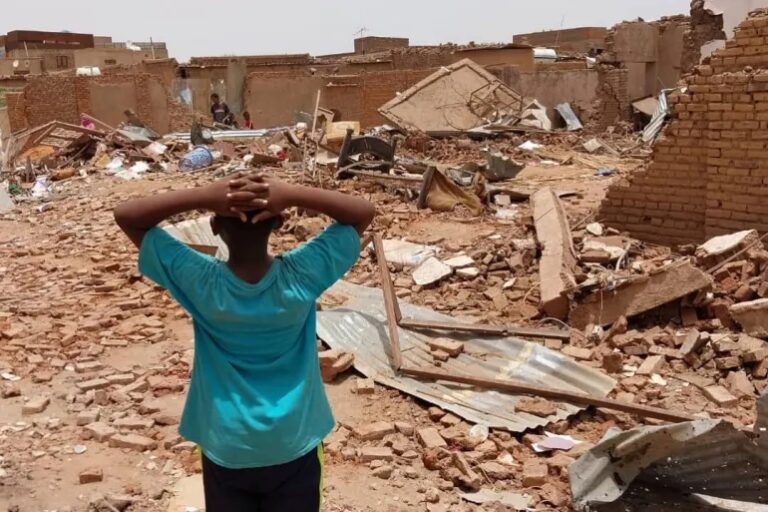Photo courtesy of Ashraf Shazly, Getty Images.
On February 11, Mohamed al-Hassan al-Taayeshi, a member of Sudan’s ruling Sovereign Council, announced that Sudan was considering the handover of former President Omar al-Bashir to the International Criminal Court (ICC). The surprise revelation came as part of a statement that included all Sudanese perpetrators of the 2003 genocide in Darfur currently wanted by the ICC. Al-Bashir, who served from 1989 until his ousting in April of 2019, is considered by the international justice community to be a ringleader of the wartime genocide that is estimated to have killed upwards of 300,000 and displaced 460,000. Since 2009, the ICC has issued multiple indictments of al-Bashir, but Bashir remained president of Sudan until his deposition last year.
The announcement followed a spate of protests in Sudan, the Hague, and other parts of the Sudanese diaspora, many calling for the accountability of those who carried out mass atrocities against multiple minority groups during the war in Sudan. Although the details of al-Bashir’s appearance before an ICC court remain murky, the unexpected cooperation of the Sudanese transitional government, which came amidst peace talks between the administration and rebel groups, is an unequivocal victory. The ICC, founded with the Rome Statute in 1998, became active in 2002, and is considered the chief international body in charge of prosecuting four crimes of international scope: genocide, war crimes, crimes against humanity, and the crime of aggression. With 139 signatories, the Rome Statute is meant to serve as a court of last resort. According to the ICC’s website, the court has issued nine convictions, 34 arrest warrants, and has heard 27 cases to date. But the court is crippled by consistent underfunding, as well as a persistent lack of cooperation by powerful countries including the U.S., which has yet to ratify the founding statute of the court, in an act that betrays a belief – smacking of American exceptionalism – that the U.S. can act with impunity.
Recently, the ICC declared that it planned to forgo an investigation into crimes against humanity in Afghanistan, citing a lack of resources. This tragic decision has implications not only for victims of injustice in Afghanistan, but for the vulnerable everywhere. States including France, Germany, Italy, Japan, and the UK have succeeded in limiting funding for the ICC, following criticism that much of the court’s focus seems to be in crimes occurring in Africa. Clearly, there is a glaring cognitive disconnect – or a selfish and willful decision – happening on the part of these states. The ICC, since its inception, has disappointed some in the international community with its seemingly slow proceedings and lack of hard power, such as an ability to deliver on arrest warrants it issues. Were the ICC to be better funded, or even signed onto, it would gain teeth, and an invaluable ability to carry out its stated purpose.
The case of al-Bashir is a success story. While not directly preventative, there is immeasurable value in holding the perpetrators of the world’s most unthinkable crimes responsible. International organization gets a bad rap for its very nature – bodies attempting to bring in hundreds of countries get dragged down into bureaucracy, and in many cases, never get brought back up. In recent decades, the United Nations has faced relentless criticism for its inefficiency and outdated structure, and not undeservedly – flaws like these have been blamed for multiple failures of peacekeeping, including catastrophes like the Rwandan genocide. According to the New York Times, “the United States has cast a veto on Council resolutions 16 times [since 1990],” in an instance of the stagnation of the beast that is the Security Council – the UN’s most powerful body. The Security Council’s five permanent members (P5), China, France, Russia, the UK, and the U.S., all wielding the extremely volatile veto power, hold their power as a reward for their victory during World War II.
The frustration with the UN is understandable, and often justified. Of course, neither the UN nor the ICC deserve to be neglected. But the possible prosecution of a genocidaire is a compelling case for the necessity of the ICC as an indispensable international organization. And yet, three of the P5 have not ratified the Rome Statute. Russia, China, and the United States – all arguably notorious to a degree for their abuses of human rights, have all neglected to participate in the mission of the court. In 2016, South Africa attempted to pull out of the ICC, as has Burundi, the Gambia, and the Philippines. The United States’ naked self interest in holding up a double standard for its actions abroad and at home is purely detrimental to the cause of international justice. The U.S. cannot continue to set an inexcusably bad example for participation in and commitment to justice and cooperation. As a country that constantly positions itself as “world police,” the U.S. is painting itself into the corner of criminal bystanderism.

